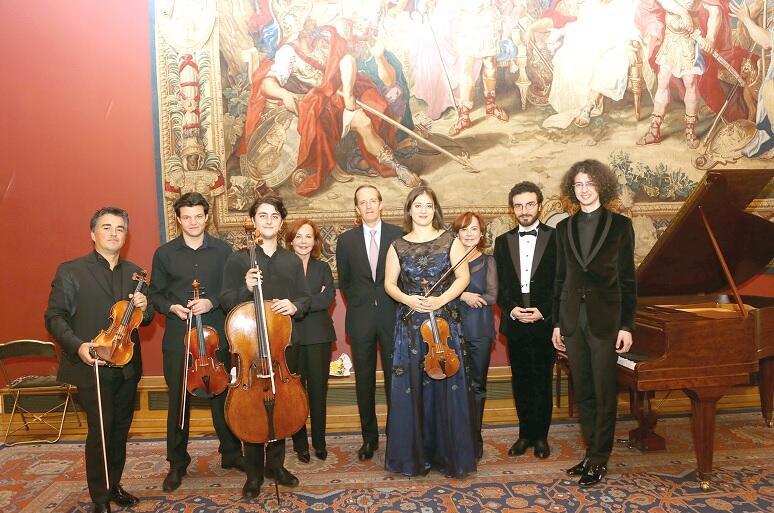
Hazal Özcan – ANKARA
Sisters Güher and Süher Pekinel and French Ambassador Charles Fries pose with the young musicians, who are scholarship students and performed a concert at the French Embassy.
Turkey’s prominent pianist Süher Pekinel on Dec. 4 said that Turkey has a lot of potential in raising talented musicians yet still has ground to cover.
Pekinel’s remarks came during a concert at the French Embassy in Ankara, where gifted young musicians enthralled the audience. The said musicians are scholarship students from a project carried out by Güher and Süher Pekinel sisters.
When asked about the current state of music and musicians in Turkey, Pekinel said that the country has a lot more potential to achieve great things in art.
“Because what you heard this evening is the works of Turkish musicians. Videlicet, we are a part of something. And you know what, we have such a part that no one expects us to have,” Süher Pekinel told the Hürriyet Daily News.
“And that is how you can be a musician of the world,” she said.
Pekinel also underlined that currently the state’s contribution into music have been lessened and this caused Turkey to experience a “musical recession.” She added that Turkey has lost two generations of artists during this process.
“That’s why we started [the projects], to promptly compensate for the loss. It was important for us to share our experience with Turkey,” she said.
Güher and Süher Pekinel, renowned Turkish twin pianists, have three ongoing projects where they discover talents from all over the country and assist them throughout their musical educations and provide opportunities at international level.
The “Young Musicians on World Stage” project, kicked off in 2010, provides scholarships to young artists for their education in the best music schools all around the world. The project has been financed by TÜPRAŞ for the last six years.
Tolga Atalay Ün, Umut Sağlam, Veriko Tchumburidze, Can Çakmur and Barok Bostancı, five of the scholarship holders of the project, presented a musical feast to the audience at the French Embassy in Ankara.
During their performance, the young artist played pieces by Franz Liszt, Franz Schubert, Antonín Dvořák and Dmitri Chostakovitch.
“These musicians prove this [the potential of Turkey]. And not only with this, they prove it with what they do. They always win first place. Not second or third, but always the first place,” Pekinel said.
“They have been ranked in the first place in which Turkey has been absent,” she added.
The success of these musicians paves the way for them to introduce Turkey to the world yet the country is not doing “what needs to be done,” Pekinel said.
‘Not much to do other than work and live for music’
Pianist Tolga Atalay Ün, who performed at the concert, said that for Turkey to improve itself in music, musicians need to continue to “work and live for music.”
“There is nothing much to do other than continue to work and live for music, just like what we do in this project,” Ün said.
The pianist is currently studying at the Royal College of Music in London.
“We all started our education in Turkey and then went abroad. The reason why preferred foreign countries is our desire to see the world. Because what we do is completely international. It does not have a nationality, it is a universal language,” he said.
Meanwhile violinist Barok Bostancı said talented artists studying abroad can return to Turkey and mentor and tutor other children.
“I think the duty is ours. When we complete our education and come back, we can guide others who want to learn and study classical music,” Bostancı said.
“We will do everything in our power as teachers,” he added.
Bostancı is a relatively newer scholarship holder of the program. He is currently studying at Hochschule für Musik Hanns Eisler in Berlin.
“I want to live [in Turkey]. There is truly no place like one’s own country. We would have really wanted to get this education without leaving Turkey,” he said.
Bostancı also added that he wants to assemble a quartette, which he sees as a shortfall in Turkey.
On the other hand, cellist Umut Sağlam said that art in Turkey can only be ameliorated by education, while echoing Ün’s remarks on expanding horizons overseas.
“This [form of art] started in Europe. Thus, the place it is most popular is Europe. Our goal is to get education there, expand our vision and turn back [to Turkey],” Sağlam said.
Sağlam is studying at the Barenboim-Said Academy in Berlin. He conveyed his dreams of opening a school in Turkey, just like the academy he is studying at, where lectures include all forms of art.
“Philosophy, history, education… I believe that all artists should have these and all branches of thinking science in themselves. And I believe that such a school must be established,” he said.
‘Turkey lacks discipline in music’
Veriko Tchumburidze, one of the prominent violinists of the project, said that foreign countries are very disciplined when it comes to musical careers, but that Turkey has deficiencies in this manner.
“If a person wants to be an artist, then they should determine their priorities. My priorities have been determined since I was a little child,” Tchumburidze said.
“This is a very hard job. Of course, we say art is our life, but it requires a lot of discipline. In Turkey there is nearly none,” she said.
Tchumburidze is one of the first scholarship holders of the Pekinels’ project. She is currently studying at the Munich University of Music and Performing Arts.
In the meantime, pianist Can Çakmur said Turkey’s budget on music should be expanded yet the country has “set music aside.”
“Let’s make a comparison between Japan, Germany and Turkey, which has similar populations. In Turkey, we have six symphony orchestras. In Germany, this figure is 138,” Çakmur said.
He also added that the relatively small amount of budget on musical activities, such as concerts, “make it harder for classical music to break its boundaries.”
Çakmur, who is currently living in Weimar, Germany, pursues his studies at the Franz Liszt University.
“The state’s support is needed to sustain this education and for it to be of good quality,” he said.






